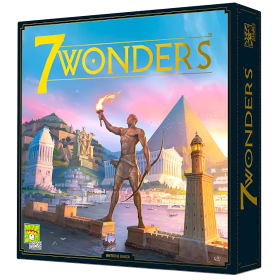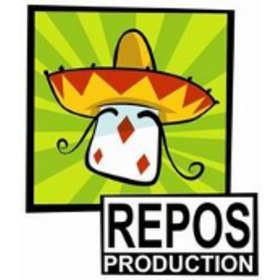7 Wonders 7W
 The most awarded strategy board game: more than 30 gaming awards. 7 Wonders is a card drafting game that is played using three decks of cards featuring depictions of ancient civilizations.
The most awarded strategy board game: more than 30 gaming awards. 7 Wonders is a card drafting game that is played using three decks of cards featuring depictions of ancient civilizations.
As the leader of one of the great 7 cities of the ancient world, you must carefully gather resources, develop commercial routes, and affirm your military supremacy.
You draft cards over multiple rounds, carefully building towards long-term goals.
Build your city and erect an architectural wonder which will transcend future times!
Spēlētāju skaits: 3 - 7
Spēles ilgums: 7 mn
Sarežģītība: 3 / 5
Spēlē 7 Wonders un 982 citas spēles tiešaistē.
Nekas nav jākačā - spēlē pa tiešo no pārlūka.
Ar saviem draugiem un tūkstošiem spēlētāju no visas pasaules.
Par brīvu.

Spēlē 7 Wonders un 982 citas spēles tiešaistē.
Nekas nav jākačā - spēlē pa tiešo no pārlūka.
Ar saviem draugiem un tūkstošiem spēlētāju no visas pasaules.
Par brīvu.

Noteikumu kopsavilkums
Overview
In 7 Wonders your aim is to make your civilization thrive over three ages, by ramping up your production of raw and/or manufactured goods, building different types of constructions, and taking care of your relations with your neighbors. During the game, you can also build and upgrade your wonder, which gives you additional advantages (points or capabilities). You do not need to construct your wonder at all, but it is recommended.
The player with the most points at the end of the game wins.
Table setup
Number of players:
• it is possible to play with 3 to 7 players on BoardGameArena.
• BoardGameArena suggests 4 players
• BoardGameGeek community suggests 4-5 players.
Choices:
• Game mode: normal and training
• Game speed: as any other game
• Wonder board side: allow players to choose their preferred side of their Wonder board, or set it randomly
Preparation
If Wonder board side has been set to Choose Wonder side, at the very beginning the players can choose between two sides of their Wonder board. Side A is usually easier to accomplish.
Gameplay
The game proceeds over 3 ages, each comprising 6 rounds.
Card drafting rounds
A round is simple: you are shown a hand of cards, you take one of them and perform one action with it, then the hand is moved on to the next player (shown by the hands rotation arrow). All players do this at the same time.
Each age starts with 7 cards in each hand. The last round happens when the player has two cards in the hand: one is selected, the other is discarded.
For each card, there can be three to four actions that you can take, shown when you hover on the card:
1. Construct
(arrow pointing to card thumbnails): Add the specific card to your capabilities, paying its associated cost if any.
The cost is shown on the top left of the card; a symbol over it shows if you are allowed to do this move:
• a red cross indicates that you don't have and can't gather the necessary resources to construct
• a yellow check mark with a number indicates how much you have to pay your neighbors to gather the necessary resources.
− You can only buy resources from a neighbor if they have that resource available.
− You pay 2 coins per resource, unless you have acquired a yellow card allowing you to buy that resource from that neighbor for only 1 coin.
• a green check mark shows that you can construct with your own resources only
2. Build wonder stage
(arrow pointing to a layered pyramid): Use this card as a marker on the lower side of the Wonder board, gaining the shown advantages (e.g. victory points, or capabilities). The Wonder plan can only be deployed passing through the stages in order, from left to right. A symbol below the next stage you can build shows you if it's possible to build it or not, with the same convention as explained above for constructing a card;
3. Sell the card
(arrow pointing to a coin with a 3 inside): Gain 3 coins
4. Construct a card
(arrow pointing to a blank card with a red cross on the top-left corner): This is optionally shown to players who have this capability, provided by one of their wonder stage. Once per age, it's possible to construct a card without paying its cost.
Some wonder stages provide additional capabilities:
• Construct a card for free in each age: as described above
• Play last card (two blank cards with a green check mark): the last card in each age is usually discarded, but the player with this capability can play it (with the usual rules regarding the cost)
• Construct a discarded card for free (many blank cards, the bigger with a red cross on it): the player can look through all discarded cards so far and build it for free
• Copy neighboring guilds (purple card with two triangles on the sides): the player will get additional points depending on the cards equipped by the neighbors at the end of the match.
Fighting
After the last card-drafting round, the age is ended and the fighting phase begins. Military capabilities are compared to award victory or lose points. This is done automatically, but you get to see how you score with an animation.
End of game Scoring
The game ends at the end of the third Age, after the Conflict tokens have been handed out. Each player totals their civilization points and the player with the highest total is declared the winner. In case of a tie, the player with the most coins in their treasury is the winner. A tie on coins is not broken further
Points are counted from 7 categories in the following order:
Military Conflicts
Each player adds their Victory and Defeat tokens (this total can be negative!).
Treasury Contents
For every 3 coins in their possession at the end of the game, players score 1 victory point. Leftover coins score no points.
Wonders
Each player then adds to their score the victory points from their wonder.
Civilian Structures
Each player adds the victory points of their Civilian structures. This amount is indicated on each Civilian structure.
Scientific Structures
The scientific cards earn victory points in two very different ways: from sets of identical symbols and from sets of 3 different symbols. Be careful : the victory points earned by both methods are cumulative.
Sets of identical symbols
For each of the 3 existing scientific symbols, the player wins the following points:
• only 1 symbol: 1 victory point
• 2 identical symbols: 4 victory points
• 3 identical symbols: 9 victory points
• 4 identical symbols: 16 victory points
Note:
• the number of points gained is equal to the number of symbols squared.
• there are 4 green cards for each symbol, for a maximum of 16 victory points per family of symbols.
• this maximum can be increased with the Scientific Guild and the Wonder of Babylon: 5 identical symbols earn 25 victory points and 6 identical symbols earn 36 victory points.
Sets of 3 different symbols
For each group of 3 different symbols, each player scores 7 victory points.
Commercial Structures
Some commercial structures from Age III grant victory points.
Guilds
Each Guild is worth a number of victory points depending on the configuration of the player’s city and/or that of the two neighboring cities (see description of the structures)


